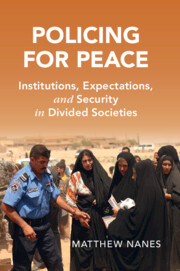
-
Select format
-
- Publisher:
- Cambridge University Press
- Publication date:
- November 2021
- November 2021
- ISBN:
- 9781108979580
- 9781108839051
- 9781108969680
- Dimensions:
- (229 x 152 mm)
- Weight & Pages:
- 0.5kg, 258 Pages
- Dimensions:
- (229 x 152 mm)
- Weight & Pages:
- 0.38kg, 258 Pages
You may already have access via personal or institutional login
Book description
In communities plagued by conflict along ethnic, racial, and religious lines, how does the representation of previously-marginalized groups in the police affect crime and security? Drawing on new evidence from policing in Iraq and Israel, Policing for Peace shows that an inclusive police force provides better services and reduces conflict, but not in the ways we might assume. Including members of marginalized groups in the police improves civilians' expectations of how the police and government will treat them, both now and in the future. These expectations are enhanced when officers are organized into mixed rather than homogeneous patrols. Iraqis indicate feeling most secure when policed by mixed officers, even more secure than they feel when policed by members of their own group. In Israel, increases in police officer diversity are associated with lower crime victimization for both Arab and Jewish citizens. In many cases, inclusive policing benefits all citizens, not just those from marginalized groups.
Contents
Metrics
Altmetric attention score
Full text views
Full text views help Loading metrics...
Loading metrics...
* Views captured on Cambridge Core between #date#. This data will be updated every 24 hours.
Usage data cannot currently be displayed.
Accessibility standard: Unknown
Why this information is here
This section outlines the accessibility features of this content - including support for screen readers, full keyboard navigation and high-contrast display options. This may not be relevant for you.
Accessibility Information
Accessibility compliance for the PDF of this book is currently unknown and may be updated in the future.


